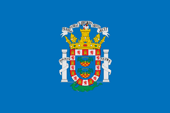|
|
| Übersicht – Contents: | |
Diese Seite ist Teil des Projektes
|
|
| Übersicht – Contents: | |
| Prolog: | |
| Die Bevölkerung besteht vorwiegend aus Spaniern sowie etwa 8000 Afrikanern und 2000 Juden. Melilla ist Freihafen. Es gibt Unternehmen der Lebensmittelindustrie, der Leichtindustrie und Werften. Von Bedeutung ist der Fischfang. Importiert wird hauptsächlich aus Spanien; der Export geht in nichtspanische Gebiete. Melilla war im Jahre 1496 von Spanien erobert worden. Melilla gehörte bis 1995 zur spanischen Provinz Málaga, und ist heute eine Automome Stadt innerhalb Spaniens. |
The population consists mainly of Spaniards as well as about 8000 Africans
and 2000 Jews. Melilla is a free port. There are companies in the food
industry, light industry and shipyards. Fishing is important. Imports are
mainly from Spain; exports go to non-Spanish areas. Melilla was conquered by Spain in 1496. Melilla was part of the Spanish province of Málaga to 1995, and is today an Autonomous City within Spain. |
| Das Gebiet von Melilla ist ein Restgebiet der ehemaligen spanischen Kolonie Spanisch-Marokko, die von 1912 bis 1956 als spanisches Protektorat in Nordmarokko bestand, und das bis auf die Plazas de Soberanía (Presidios) aufgegeben wurde. Die Presidios waren seit der frühen Neuzeit in spanischem Besitz befindliche, damalige Deportationsplätze für Sträflinge an der Nordküste Marokkos. Zu den Presidios gehören noch bis heute folgende Besitzungen: | The area of Melilla is a
residual area of the former Spanish colony of Spanish Morocco, which existed from 1912 to
1956 as a Spanish protectorate in northern Morocco, and was given up except the Plazas de
Soberanía (Presidios). The Presidios had been from the early modern period Spanish possession, then deportation places for convicts on the north coast of Morocco. The Presidios are still until today the following possessions: |
|
• Ceuta (84.777 Ew.), • Melilla (86.487 Ew.), • Perejil (unbewohnt), • Peñon de Velez de la Gomera, • Alhucemas-Inseln, • Chafarinas-Inseln (letztere drei zusammen 300 Ew.) |
• Ceuta (84.777 inhabitants) • Melilla (86.487 inhabitants) • Perejil (uninhabited) • Penon de Velez de la Gomera • Alhucemas Islands • Chafarinas Islands (the latter three alltogether 300 inhabitants) |
| Manchmal werden die Plazas de Soberanía auch immer noch als Spanisch-Nordafrika bezeichnet. Marokko erhebt Anspruch auf die Plazas und somit auch auf Melilla. | Sometimes the Plazas de
Soberanía are even called as Spanish North Africa. Morocco claims the Plazas de Soberanía and in this way Melilla too. |
| Quelle/Source: Länder der Erde, Wikipedia (D), Volker Preuss | |
Flagge – Flag: |
|
 |
Dienstflagge – official flag, Seitenverhältnis – ratio = 2:3, Quelle/Source: commons.wikimedia.org |
| Die Flagge von Melila ist einfarbig blau und zeigt in Ihrer Mitte das Wappen der Stadt. Links und rechts des Schildes die "Säulen des Herkules", die auch beiderseits des spanischen Wappens stehen. | The flag of Melila is single-coloured blue and shows in its middle the coat of arms of the city. To the left and to the right of the shield the "Columns of Hercules", which also stand on both sides of the Spanish coat of arms. |
| Quelle/Source: Wikipedia (DE) | |
| Landkarte von Spanisch-Nordafrika – Map of Spanish North Africa: |
|
| Landkarte von Melilla – Map of Melilla: |
| Zahlen und Fakten – Numbers and Facts: | |
|
|
|
|
|
|
|
|
|
|
|
|
|
|
Geschichte: |
| 1100–600
v.Chr. · phönizische Stadt "Rusadir" bis 146 v.Chr. · zu Karthago 42 · zum Römischen Reich 395 · zum Weströmischen Reich ca. 470 · maurische Eroberung 711 · islamisch-arabische Eroberung, zum Omajjaden-Kalifat, Name: "Mlila" 17.09.1497 · Eroberung durch Spanien 1847–1912 · die Spanischen Besitzungen an der Nordküste Afrikas (Presidios) werden als Generalkapitanat zusammengefasst 1912–1956 · Melilla ist Teil von Spanisch-Marokko 1956 · Melilla wird der spanischen Provinz Málaga angeschlossen 14.03.1995 · Autonome Stadt Melilla |
History: |
| 1100–600
B.C. · phoenician city "Rusadir" to 146 B.C. · to Karthago 42 A.D. · to the Roman Empire 395 · to the West Roman Empire ca. 470 · moorish conquest 711 · Islamic-Arabian capture, to the Umayyad Caliphate, name: "Mlila" 17th of September in 1497 · conquest by Spain 1847–1912 · the Spanish possessions at the northern coast of Africa become united as a captaincy-general 1912–1956 · Melilla is a part of Spanish Morocco 1956 · Melilla comes to the Spanish Province of Málaga 14th of March 1995 · Autonomous City of Melilla |
| Quelle/Source: Atlas zur Geschichte, World Statesmen, Wikipedia (D) |
Ursprung des Landesnamens – Origin of the Country's Name: |
|
| Die erste Erwähnung der Siedlung ist die phönizische Stadt "Rusadir". Die Araber nannten sie "Mlila". | The first mention of the settlement is the Phoenician city "Rusadir". The Arabs called it "Mlila". |
| Quelle/Source: Wikipedia (D), Meyers Konversationslexikon, 1908 | |